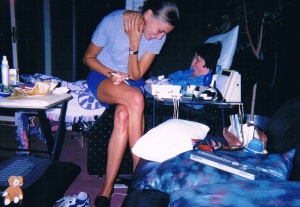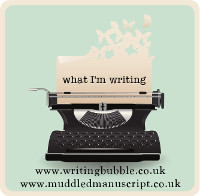My writing and blogging friend Dina Relles recently posted a prompt on Literary Mama about something read or spoken that has stayed with you.
At first, I was at a loss. My recall memory is kind of awful, just ask my husband who corrects me every time we have one of those he-said/she-said arguments, but then, suddenly, as though pulled along by an invisible thread, the words arrived.
It will never be enough.
Lucie spoke those words to me in the kitchen of my childhood home. We were huddled close and speaking in low voices about my mother, who was dozing or resting in the nearby family room. There was no worry or concern that she would overhear us because she had lost the use of her legs, and her arms, many years before.
My parents hired Lucie soon after my mother was diagnosed with multiple sclerosis. Her job was to help with chores around the house, drive me and my brother places, and cook dinner. Basically, do the things my mother would soon be unable to do.
I was fourteen when I met her, and she was about thirty years old, maybe younger. A single mom with two small children, she needed work with flexible hours. I remember so clearly the day she came to us. She had dark eyes and a somber, quiet demeanor. Later, we would know her laugh intimately, her dry wit and her bawdy humor similar to my mother’s. But that day she was a stranger.
I can still see her sitting at our kitchen table, hands on her lap, speaking in a soft, low voice. I don’t remember what she said that day, but seventeen years later, we’d have a conversation that I would never forget.
We stood in the kitchen, our heads touching, in front of the sink with windows looking out at the overgrown back yard, an empty space where the white metal playground used to stand. Lucie’s big brown eyes were soupy with tears.
I thought she was going to die, she whispered to me. We were talking about my mother. I was thirty-one years old and Lucie in her late 40s.
What happened, I asked, and she told me about how my mother had been on a different medication for the last month or so. I think it was killing her, she said. Your father didn’t want to worry you, but I thought, what if she dies and you found out later that we didn’t tell you.
We stood with this possibility hanging in the air, and then embraced. I thanked her for telling me now and asked her to please call me if this happened again.
Is she okay now? I asked, my chin pointing toward the other room.
She’s better than she was, Lucie said, after a moment. But I don’t know Dana, I don’t know.
Her eyes welled up again and I felt a weight drop hard on my chest. I gripped the counter, staring out the window as my mother must have on occasion while watching me and my brother play tag or scramble up the jungle gym.
Do you think she’s going to die? Do you think I should move back home? I asked, my mind wild and panicked at the possibility. I began to wonder about logistics. How could I leave behind my life, but how could I not?
What should I do? I asked, feeling desperate. I wanted her to tell me what to do, to give me permission, to lead the way through this unchartered territory.
That’s when she looked at me square in the eye. Her expression serious and mournful. I can’t answer that, she said, you have to live your life. You have a home, a job, a husband.
I must admit I felt a shiver of relief because as deeply as I loved my mom, oh so deeply, I also felt afraid of living right up against her pain, day in and day out.
But Lucie wasn’t done. She took my hands in hers, she stepped closer, and what she said next will never, ever leave me.
The truth is, she whispered, her eyes dark and wet, it doesn’t matter if you move back home or not, because whatever you do it will never be enough. When she dies, you will always, always want more.
We wept together, Lucie and I, as we would in another kitchen, in another six months, when my mother was dying.
Is it strange to say that despite the panic and fear I felt upon hearing those words, that later they would bring me solace?
Later, in my grief, in the empty space left behind after my mother died, I forgave myself for not moving back home. I felt regret, for that and more, but in the back of my mind, those words rang out, not as a punishment or chastisement, but as a balm, a loving caress across my cheek, those words held me close and told me I had done as much as I could and yet, and yet, it would never be enough.
If you write your own version of words that stick, leave it in the comments below. I would love to read it.
I’ve also shared this on Writing Bubble’s, What I’m Writing, weekly link-up.



